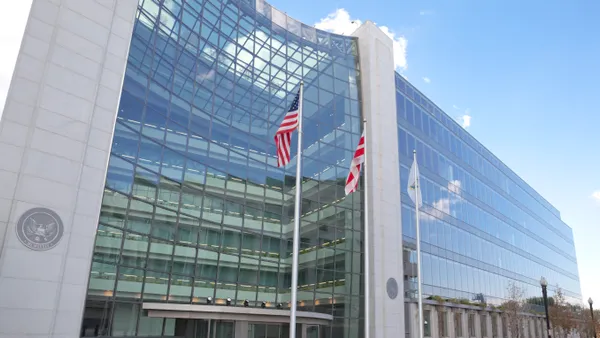Dive Brief:
- BlackRock said the proliferation of domestic and international environmental, social and governance regulations expose the firm to increased scrutiny and uncertainty, according to its annual 10-K filing with the Securities and Exchange Commission.
- The nation’s largest firm, by assets under management, listed ESG under potential legal, regulatory and reputational risks, and said increasing focus from regulators, as well as officials, clients and other stakeholders on ESG could “adversely impact” the company’s reputation and business.
- The asset manager also noted in the Feb. 23 filing that state laws targeting firms that “boycott” certain industries or restrict consideration of ESG factors, and the potential for more states to do so, could also “adversely impact BlackRock’s business.” Currently the firm is on such lists in four states and has had Republican governments in others pull investments over ESG.
Dive Insight:
BlackRock reported it pulled in around the same total revenue in 2023 as 2022 — $17.859 billion in 2023 after bringing in $18.873 billion in 2022, down by 0.08% — but said the increase in global standards-setting and rulemaking around ESG matters could increase compliance costs for the firm.
The Larry Fink-led firm also said that given the scrutiny, it could be criticized for scope or nature of potential corporate ESG goals and initiatives, as well as any potential revisions to them. BlackRock said its ESG-related initiatives or goals could be “difficult or costly to implement” and may not happen at the anticipated pace, within the projected time frame “or at all,” according to the filing.
The firm also said its prominence, scale and investments all subject the company to heightened scrutiny, which “has resulted in negative publicity and adverse actions for BlackRock and may continue to do so in the future.”
“Any perceived or actual action or lack thereof, or perceived lack of transparency, by BlackRock on matters subject to scrutiny, such as ESG, may be viewed differently by various stakeholders and adversely impact BlackRock’s reputation and business, including through redemptions or terminations by clients, and legal and governmental action and scrutiny,” the firm said in its filing.
BlackRock mentioned the SEC’s climate disclosure rule — which will be voted on this Wednesday — along with expected rules on ESG disclosures, human capital management and board diversity as national regulations it will have to potentially comply with. The firm said the SEC “has also increased scrutiny of disclosure and compliance issues relating to investment advisers’ and funds’ ESG strategies, policies and procedures.”
When examining the various regulations and reporting frameworks being developed and implemented in jurisdictions it operates in, the New York City-based asset manager mentioned the International Sustainability Standards Board’s reporting frameworks, which it said “may inform national regulators’ approaches,” and noted multiple jurisdictions have already signaled their endorsement. The firm also mentioned various ESG-related regulations in effect in the United Kingdom and European Union, including the Corporate Sustainability Reporting Directive.
“ESG and sustainability have been the subject of increased regulatory focus across jurisdictions,” the firm reported. BlackRock said it’s facing “increased fragmentation risk” due to the variety of jurisdictional rules, as well as “complex and potentially conflicting compliance obligations.”
The asset manager said its clients have a variety of portfolio priorities, “including those who want to increase their exposure to the low-carbon transition and those who choose not to invest in products or strategies with sustainable investment objectives.”
In addition to allowing investors to choose whether to align its portfolio with ESG objectives, the firm expanded proxy voting power to individual iShares investors for the first time last month. Investors could continue to allow BlackRock to make all proxy voting decisions, or choose from six third-party voting policies, including at least four that have environmental, social or governance priorities.
BlackRock said that the divergence in perception on ESG could negatively impact its business through “withdrawals, redemptions, terminations or decisions not to commit or invest new capital by clients, as well as legal and governmental action and scrutiny.”
The firm has increasingly turned towards funding climate transition infrastructure, receiving $1 billion in financing for its energy transition infrastructure fund in November before making a $12.5 billion bet on the market in January, with the acquisition of Global Infrastructure Partners.












